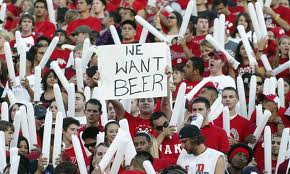By Mark Baber
September 12 – Academics at Newcastle University say that the government should consider restricting alcohol marketing during televised football matches, “after studying a selection of games and finding they were ‘bombarded’ by references [sic] to drink.”
According to the Newcastle University press release, in a paper published in the journal Alcohol and Alcoholism and announced at a press conference at the British Science festival in Newcastle, the team or researchers found that on average there were 111.3 visual references to alcohol for every hour of football broadcast in six football games they studied, including images on billboards at the side of the pitch and other references during replays or when scores were shown or substitutions were being made.
The academics watched 18 hours and 21 minutes of football coverage on BBC, ITV and Sky TV to come to their conclusions, in which time they spotted 2,042 visual references to alcohol of various types, mainly beer as well as 32 verbal mentions (28 of which were of match or competition sponsors) and 17 adverts during the matches, from last season, including games in the Premier League, Champions League, FA Cup, League Cup, UEFA Cup and Championship. Of the 32 verbal references 28 were mentions of the competition sponsors with the remaining four being of “hang-overs.”
Dr Jean Adams, senior lecturer in public health at Newcastle University and a member of Fuse, the Centre for Translational Research in Public Health, British Heart Foundation (BHF) which is funded by Cancer Research UK, the Economic & Social Research Council, the Medical Research Council and the National Institute for Health Research, said: “Alcohol–related hospital admission are continuing to rise, despite alcohol consumption falling overall because the heaviest drinkers are consuming more.
“This type of study has never been done before in the UK, looking at alcohol marketing during televised football matches. We wanted as broad a picture as possible, which is why we chose the matches from different broadcasters and from different competitions.”
Equating alcohol advertising with tobacco advertising and arguing that “previous studies have shown that alcohol marketing increases the likelihood that young people will start to use alcohol and will drink more if they already use it,” the academics argue restrictions should be imposed.
Andy Graham, speciality registrar in public health with the NHS, said: “Our findings show that young people are likely to be hugely exposed to alcohol marketing during televised football matches, and this is likely to have an influence on their attitudes to alcohol. We were surprised by just how many images there were during these games, it was a constant bombardment.
“We believe a similar restriction to that imposed on tobacco products may be justified.”
It is unclear from the survey how many of the “references” [sic] would be noticed by the average viewer, who would presumably be more interested in watching the football than reading the advertising hoardings, but according to Dr Jean Adams, “Kids are very aware of this stuff. One survey of 13-year-olds found that 96% of them are aware of alcohol marketing, and alcohol marketing in football matches matters because it’s a hugely popular spectator sport.”
Contact the writer of this story at moc.l1745176419labto1745176419ofdlr1745176419owedi1745176419sni@r1745176419ebab.1745176419kram1745176419

